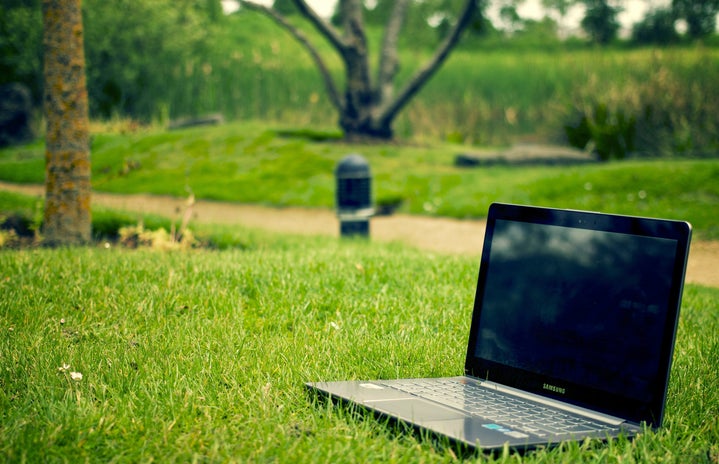College is a time to explore opportunities, get involved, and shape not only yourself, but the community around you. It’s a unique place where people from diverse backgrounds, identities, fields of study, and abilities all come together for the purpose of learning and advancing their futures. Colleges also help to shape the culture of our larger society as a whole. Things can be created, innovated, and implemented in a collegiate setting that can influence and inspire the outside world to change for the better.
George Mason University is at an exciting place in its history where it is ripe with opportunity to be a sustainable institution, as well as home to students, faculty and staff who are all wanting to create that. I sat down virtually with Ben Auger, the Program Manager for Education and Outreach for George Mason’s Office of Sustainability (OoS) to discuss the culture of sustainability on campus, what the OoS is doing to help that, and the importance of student involvement.
“I think that Mason students are coming to Mason because they want to be a part of creating a better world, and I think that students are really keyed into that positive impact within their areas of focus,” says Ben.
So how do we create a culture of sustainability on campus? Sustainability at George Mason, as defined by Ben and the OoS is “a holistic and collaborative people-driven process defined by environmental and social justice that center’s Mason’s institutional needs in innovative and evolutionary response to the most pressing challenges of our time.” There’s a heavy emphasis here on the social and environmental justice side of sustainability. This means that in order to create a sustainable culture, all people and their needs must be at the heart of every action and decision made. “No one should be left behind or forgotten or not heard or not listened or not valued in a truly sustainable community,” according to Ben.
The OoS’s main goal is to help George Mason become the best institution it can be for people and the planet. As someone who has lived on campus for all of my college career, I find it hard sometimes to see how impactful my actions are when I don’t control lights being left on in hallways or if the only appetizing thing at the dining halls is a meat dish. This doesn’t mean that your actions are meaningless! Individual behavior change can be extremely important, especially in the ways that your behavior can affect what others around you do.
Individually, students can practice sustainable behavior by avoiding single-use plastic bottles, utilizing the water bottle refill stations on campus, recycle, and switching from single-occupancy vehicles to biking or taking campus shuttles. Ben notes that printing is also a really easy area where students can work on cutting back on. The OoS’s Green Residence Program helps to highlight ways that students can decrease their individual footprint, in areas such as water and energy conservation, waste reduction, and dining.
Students, and really anyone in the GMU community, can also get involved in larger ways. The Greenhouse and Gardens at Mason produce fresh food year-round and are always open to volunteers to come help and learn about sustainable agriculture. Much of the produce harvested at the three sites are sold back to the dining halls on campus, participating in a hyperlocal community when it comes to food.

There’s also opportunity in creating infrastructural long-lasting impacts related to sustainability. The Patriot Green Fund (PGF) is a $100,000 a year annual fund that facilities provides that are for student and faculty projects that would improve Mason’s sustainability. A great example of a student-led project came after the 2019 Patriot Hacks event in which groups of students come together to use different technologies and innovative ways to solve various problems. “There was a group that had an amazing proposal to fully automate the entire watering and heating system in the Presidents Park Greenhouse…They won first prize from us at the Office of Sustainability and first from all of Patriot Hacks,” says Ben. This group later applied for a PGF grant and are currently working to implement this system in the campus greenhouse.
And while environmental sustainability at Mason began about 20 years ago through institutional actions, today we are seeing more direct impacts coming from student advocacy and interest. In Fall 2019, student groups organized the Fridays for Future Rally held on campus inspired by Greta Thunberg’s climate protests. Participants and a wide array of groups joined together to help to call out the university to make climate change their priority. GMU responded by tasking the Mason Sustainability Council with creating a new strategic plan for sustainability as well as with updating its Climate Action Plan, which in 2010 committed the university to carbon neutrality by 2050. “Because of student engagement and student activism, because of commitment to really creating a better world for people and the planet, Mason responded and said ‘You’re right and we hear you’,” says Ben.
A sustainable community can only be achieved through collaboration. The OoS exemplifies this with their amazing staff that does work in a wide array of areas. From their initial beginnings as an office of a single sustainability coordinator, they now have a full team specializing and working in programs including overseeing the Patriot Green Fund, zero waste, on-campus dining, alternative transportation, and the gardens and greenhouse. “The work that we’re doing is a collaborative effort. It’s our whole office, everything that we achieve is only because we work together and we work in that collaborative, communicative, integrative transdisciplinary way,” says Ben. Their operations are also possible largely due to the partnerships they’ve cultivated with campus partners like Mason Dining, Housing and Residence Life, and Mason’s Institute for a Sustainable Earth.
And they want students to be a part of that. Ben cites that one of the biggest challenges that the Office faces is visibility. “I think that students are aware [of sustainability] and they want to make an impact and if we could just connect them with opportunities for that impact and show them how it connects with sustainability, then I think we can have everyone say ‘Yeah I’m a sustainability advocate because I can see how my area of study connects to sustainability at large,’” says Ben. Achieving this collaboration with everyone at George Mason is integral, especially in working towards carbon neutrality on campus, in which the OoS is committed to advancing that 2050 deadline. “Current science suggests that 2050, although previously appropriate, is no longer appropriate. If we can advance that, then we can advance everything else at Mason.”
Ben’s favorite thing about sustainability at George Mason is when students, faculty, staff, and community members all come together to help achieve a better institution for everyone. “It’s why I do this work,” he says, “because I’m really committed to making a difference for people and the planet and I want to work with other people to help them do that too.”
You can connect with George Mason’s Office of Sustainability through their Instagram, Twitter, and Facebook pages all at the @greengmu handle. They also welcome anyone to contact them via email (gogreen@gmu.edu) about new ideas, questions, and everything sustainability.



